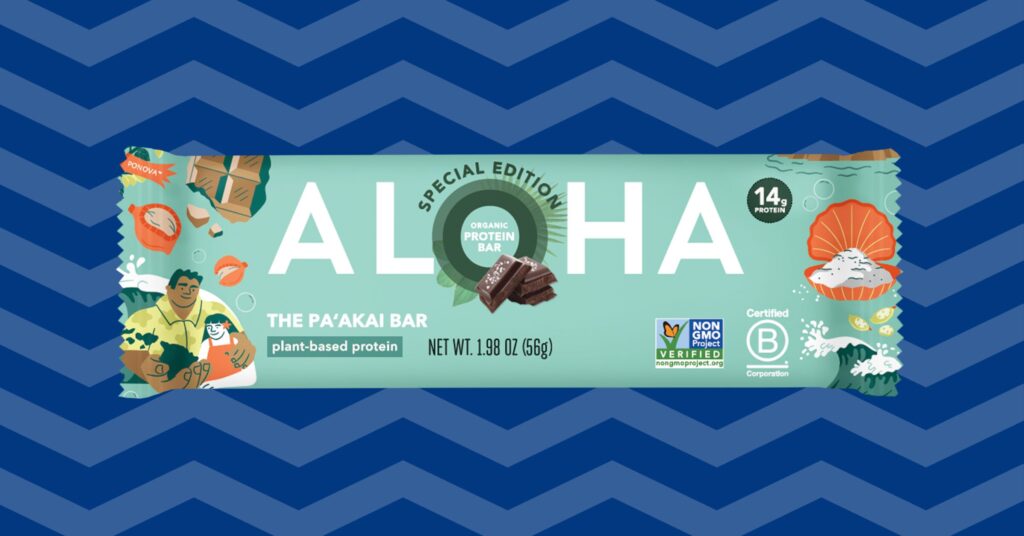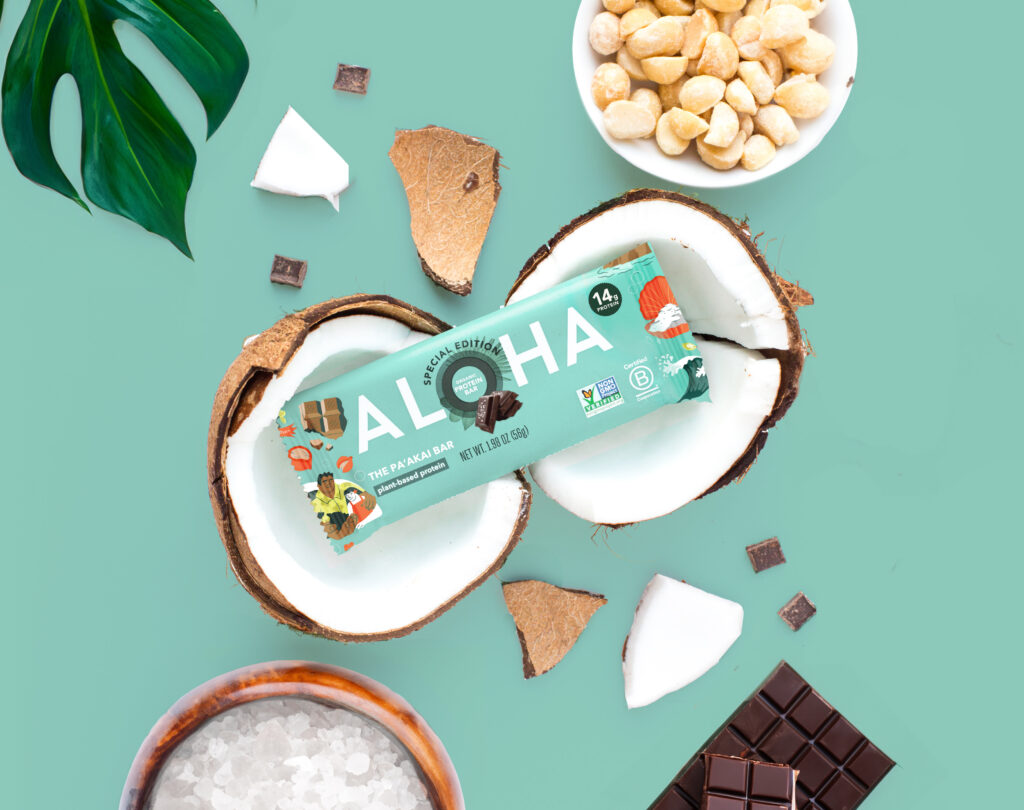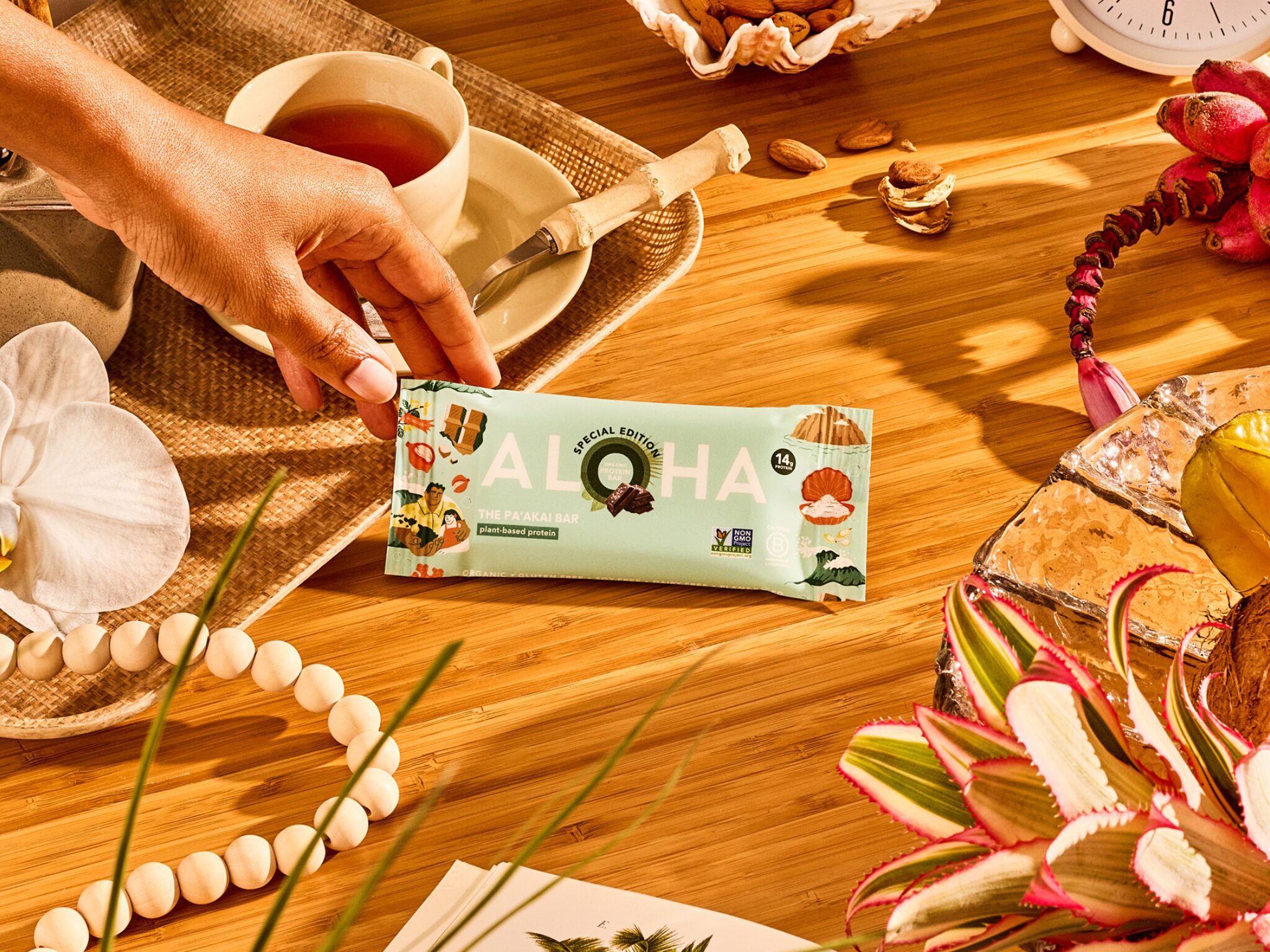5 Mins Read
New York-based plant protein brand Aloha has launched the Pa’akai Bar, the second product born out of its collaboration with Californian company Terviva, which uses its edible pongamia bean oil called Ponova.
A year after releasing the Kona Bar, Aloha is rolling out its second protein bar using Ponova, the edible pongamia bean oil developed by Terviva. The Pa’akai Bar is a special-edition product that makes use of locally sourced, sustainable ingredients, with a portion of the benefits going to empowering Hawaiian youth.
The new bar is a namesake of a term that carries cultural significance in Hawai’i. In Hawaiian, pa’akai refers to ‘solid ocean’ or ‘sea salt’, and is used as a connotation for preserving and flavouring food, as well as being associated with perceived health benefits.
“Our partnership with Aloha is critical to introducing more people to our sustainable, delicious and versatile Ponova oil. We have been humbled by the response to the Kona Bar since its launch in 2023, and we are excited to see how customers respond to the rich flavour of the Pa’akai Bar made with Ponova oil,” said Terviva founder and CEO Naveen Sikka.
The launch comes just as SemCap Food and Nutrition secured a “significant” minority stake in Aloha, after buying out early-stage angel investors with a $68M investment.

Pa’akai Bar extends Aloha’s climate and social cred
Aloha’s Pa’akai Bar is inspired by the North Pacific Ocean and, like its predecessor, it comprises responsibly grown ingredients. These include sea salt crystallised from the channel islands of Hawai’i, Hawaiian macadamia nuts grown using renewable energy, organic dark chocolate, an organic blend of brown rice and pumpkin seed protein, sunflower and cashew butter, and Ponova oil.
Another thing it shares with the Kona Bar is the initiative to donate 10% of proceeds from every bar sold to the environmental education non-profit Kupu, which empowers Hawaiian youth through service, education and workforce development in natural resources, climate change mitigation, and agriculture.
This plays into the sustainability strides made by Aloha. It’s certified B Corp and last year was accredited as a Carbon Neutral Certified business, the first plant protein brand to earn that badge. The company has had a tangible social impact too, having helped contribute and donate more than 173,000 meals in 2021 and 2022.
“Here at Aloha, our mission is clear: to nourish the world by sharing delicious and nutritious food made with traceable, high-quality, better-for-you ingredients,” said Aloha CEO Brad Charron. “Hawai’i is a beacon of inspiration for land stewardship and sustainable farming, initiatives that we hold dear. As a small, employee-owned company, we’re dedicated to making a difference by balancing our own scaling growth with equal parts of impact.”
Then there are the health benefits. The Pa’akai Bar, which happens to be gluten-free, is packed with 14g of protein and 10g of fibre per 56g pack. It also contains 12g of fat, 7g of which are unsaturated ‘good’ fats. It’s available on Aloha’s e-commerce website at $21.99 for a six-pack, and will be introduced to additional online retailers, including Thrive Market, in the coming months.
“Our mission is at the center of everything we do, and that includes a competitive price point,” a Terviva spokesperson told Green Queen. “As we scale up production of our sustainable Ponova oil, we expect costs to decrease while still maintaining our core principles of environmental stewardship, social responsibility, and transparent sourcing. Our goal is to offer a premium, impact-driven, and delicious oil at an accessible price point.”
“The Pa’akai Bar exemplifies our commitment to using our business as a force for good, alongside other sustainability-minded brands, farmers, and organisations,” added Charron.

The environmental and health credentials of Ponova oil
The environmental credentials of the Pa’akai Bar are headlined by the use of Terviva’s Ponova oil, which is derived from pongamia bean trees. These are fast-growing evergreen trees that are native to sub-tropical regions, and have historically been used for reforestation in Asia. They can restore soil quality, sequester carbon, reduce water and fertiliser use, and withstand climate extremes.
Terviva’s Ponova oil comes from the ultra-regenerative pongamia trees in Oahu, with a supply chain based in the sub-tropical regions of the US and India. They help convert distressed farmland into sustainable, productive acreage, making for a valuable income stream for local farmers and communities.
The Ponova oil is expeller pressed and lightly refined in a process similar to olive oil, with a “golden, amber colour” and “light, nutty and green aroma and flavour” akin to very light olive oil, without any astringency, according to the Terviva representative. “Its texture is notably richer than most other vegetable oils,” they added.
It has 55% of healthy omega-9 fatty acids (which is said to help reduce cholesterol levels) and 18% of polyunsaturated fats. Functionally, it can replace ingredients high in saturated fats, like coconut oil, in prepared foods like alternative dairy products, mayonnaise, spreads, baked goods and plant-based meats. “In plant-based cream cheese, Ponova oil can replace up to 75% of the coconut oil typically used in this application, resulting in a 50% saturated fat reduction per serving,” the spokesperson said.
Moroever, Ponova oil has a high smoke point of 225°C/437oF, making it a good frying oil. This will appeal to restaurants and manufacturers ditching conventional vegetable oils that contain saturated and trans fats, and have a high carbon footprint, and looking to replace them without compromising functionality. This is why it was recognised as a World Changing Idea by Fast Company in 2023 for its potential to positively reshape the food industry as an ingredient and cooking oil.
“We don’t currently have any culinary oil products planned as we are engaging in some co-marketing opportunities with small volumes for regional and small-scale campaigns in 2025,” the representative revealed. “In the latter half of 2026, we will be adding substantial volume and are seeking early adopting partners to work with us now in preparation for scale.”
Other companies producing sustainable and good-for-you fats include Zero Acre Farms, whose sugarcane-based fermented oil has made it into the kitchens of some Shake Shack and Hopdoddy locations, and Algae Cooking Club, which has impressed chefs like Eleven Madison Park’s Daniel Humm with its microalgae-derived oil.




